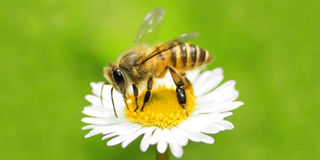Alarm as pesticides push number of bees down

Neonicotinoid pesticides depress bees’ survival in varied conditions. FILE PHOTO | NATION MEDIA GROUP
What you need to know:
- With the declining number of bees, food production is at risk as pollination will be adversely affected.
- The pesticides depress bees’ survival in varied conditions, threaten the queen bee and affect reproduction.
- Bees rely on nectar and pollen from plants for their feeding, honey-making and survival, and once the plants are sprayed with pesticides, they ingest the compounds, which end up in the honey they produce.
Crop farming may soon be in peril as research indicates that bees, which are the main plant pollinators, are on the decline.
Plants majorly dependent on pollinating agents such as bees for production.
With the declining number of bees, food production is at risk as pollination will be adversely affected.
The bees account for more than 70 per cent of the world’s major crops’ pollinators.
Dr Michael Lattorff, a senior scientist in environmental health, and an expert in African insect science for food and health at the International Centre of Insect Physiology and Ecology (Icipe), said all crops ranging from horticulture to trees require bees for reproduction.
“While Kenya, Northern Ethiopia and Tanzania have among the highest population of bees in the region, chemical pesticide use is affecting these bees’ wellbeing and arguably their population,” he said.
A recent research conducted by Switzerland’s University of Neuchatel identified neonicotinoid pesticides, which are widely used agriculturally, as a key factor responsible for the decline in bee numbers.
The research deduced that nearly 75 per cent of honey produced in the world contains at least one or more of the toxic components found in neonicotinoid pesticides, which are harmful to bees.
THREATEN QUEEN BEE
The pesticides depress bees’ survival in varied conditions, threaten the queen bee and affect reproduction.
The insects fare poorly when exposed to neonicotinoids in combination with other fungicide crop treatments.
Additionally, the chemicals disrupt bees’ immune systems, making them susceptible to viral infections to which they have normally been resistant.
They further intoxicate and disorient the insects which in turn lose their way to the hives and in the end affect human health.
Dr Lattoff said while not much is known on the population of wild bees, honey bees’ population can be estimated.
“The discovery of neonicotinoid chemical elements such as thiamethoxam, acetamiprid, clothianidin, imidacloprid and thiacloprid in honey from different regions worldwide suggests the bees ingest them during their feeding,” he said.
Bees rely on nectar and pollen from plants for their feeding, honey-making and survival, and once the plants are sprayed with pesticides, they ingest the compounds, which end up in the honey they produce.
“Pests natural enemies such as wasps, friendly fungi which feed on pests and insects and other biological integrated pest management practices are the best to use,” said Dr Lattorff.
-Additional reporting from Xinhua.





